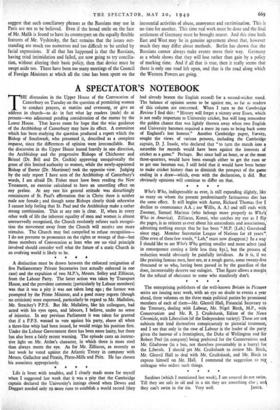A SPECTATOR 'S NOTEBOOK
THE discussion in the Upper House of the Convocation of Canterbury on Tuesday on the question of permitting women to conduct prayers, at mattins and evensong, or give an address in church—to do in fact what lay readers (male) do at present—was adjourned pending consideration of the matter by the Lower House. That leaves room for hope that the wise guidance of the Archbishop of Canterbury may have its effect. A committee which has been studying the question produced a report which the Bishop of Southwark, who presented it, described as a complete impasse, since the differences of opinion were irreconcilable. But the discussion in the Upper House leaned heavily in one direction, the Archbishop and the progressive Bishops of Chichester and Bristol (Dr. Bell and Dr. Cockin) approving unequivocally the grant of this limited authority to women, while the newly-appointed Bishop of Exeter (Dr. Mortimer) took the opposite view. Judging by the only report I have seen of the Archbishop of Canterbury's words, I am afraid Dr. Fisher must have been reading the New Testament, an exercise calculated to have an unsettling effect on any prelate. At any rate his general attitude was disturbingly reminiscent of St. Paul's affirmation that in Christ there is neither male nor female ; and though some Bishops clearly think otherwise I cannot help feeling that St. Paul and the Archbishop make a rather strong combination. This at any rate is clear. If, when in every other walk of life the inherent equality of men and women is almost unreservedly recognised, the Church resolutely refuses such recogni- tion the movement away from the Church will receive one more stimulus. The Church may feel compelled to refuse recognition— I do not presume to pronounce on the rights or wrongs of that—but those members of Convocation at least who see no vital principle involved should consider well what the future of a static Church in an evolving world is likely to be.










































 Previous page
Previous page